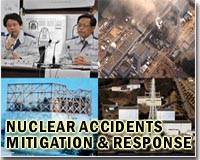 |
Tokyo (AFP) May 10, 2011 Japan's Prime Minister Naoto Kan said Tuesday he would not accept his premier's wage until a crisis at the tsunami-hit Fukushima nuclear plant is over and pledged a full review of the country's energy policy. Kan was speaking hours after about 100 villagers who fled their homes near the stricken plant made brief but emotional return journeys into the rural no-man's land in radiation suits and masks to pick up personal belongings. Japan was plunged into a nuclear crisis by the March 11 quake-tsunami that hit the plant, causing partial reactor meltdowns, explosions and radiation leaks in the world's worst atomic accident since Chernobyl 25 years ago. The centre-left leader in a televised press conference signalled that Japan would maintain nuclear power but also boost the role of renewables, making them key pillars of the energy policy of the world's number three economy. Kan said that "along with the plant operator, TEPCO (Tokyo Electric Power Company), the government bears a great responsibility for the nuclear accident as it has pursued a nuclear energy policy". Apologising to the nation, he said: "I have decided to give up my annual allowance as prime minister from June, until we can see the prospect of a solution to the nuclear accident." Kan was set to forego his 1.6 million yen (about $20,000) monthly premier's wage, but was to keep his lawmaker's wage of nearly 800,000 yen, the cabinet office said. Earlier Tuesday TEPCO said its president Masataka Shimizu and other directors would also return their remuneration "for the time being". The prime minister -- who has in recent days called for a shutdown of another nuclear plant, Hamaoka, in a quake-prone area southwest of Tokyo -- pledged that atomic power must be made safer. "As for our energy policy, we must first of all thoroughly examine our policy on nuclear power and implement it by seeking safer ways to secure nuclear power," he said. He reiterated the government's stance that Japan will not turn its back on nuclear power. The highly industrialised country, which is also heavily dependent on Middle Eastern oil, currently has 54 reactors. The premier said that "nuclear power and fossil fuels have been two major pillars of the Japanese energy policy". "I think two more pillars are important because of climate change," he said. "Japan will add renewables to its core energy sources, while aiming to create an energy-saving society." Kan said Japan had been aiming to source 50 percent of its energy from nuclear power by 2030 and 20 percent from renewables. "But this plan needs to be reviewed from scratch," he said, pledging an independent probe into the nuclear accident. UN Secretary General Ban Ki-moon later announced a high-level UN meeting on nuclear safety in New York on September 22 during the UN General Assembly session, and said international systems for safety breaches were incomplete. "Recent events suggest that there are large gaps in how societies and the international system think and act about breaches to nuclear safety," he said at a UN conference in Geneva on reducing disaster risk. Plant operator TEPCO earlier submitted a request to the Japanese government for aid to help it compensate those affected by the stricken plant. Some analysts have forecast that the utility faces compensation claims totalling around 10 trillion yen ($125 billion). The government is expected to decide on an assistance package for TEPCO later this week. The disaster has forced the evacuation of tens of thousands of people from their houses and farms in a 20-kilometre (12-mile) radius around the plant. Nearly 100 villagers forced to flee one village joined a two-hour return trip, the first of many to be organised by the government into the no-go zone. Some wept and others voiced concern about radiation contamination during the visit, which gave the evacuees the chance to salvage photos of loved ones or merely spend a reflective few moments in familiar surroundings. Each villager was allowed to fill a 70-by-70-centimetre (27-by-27-inch) plastic bag with personal items. On their way out, they went through health checks and radiation screening both for themselves and the things they carried. One of those taken back inside the no-man's land -- a rural area now left to roaming livestock and abandoned pets -- was a middle-aged housewife who took the chance to clear rotten food from her refrigerator. "I have to take out everything and throw it away," she told a TV crew travelling with the group. "I dream of the day when I can come home and fill it up again."
Share This Article With Planet Earth
Related Links Bringing Order To A World Of Disasters A world of storm and tempest When the Earth Quakes
 Japan nuclear crew may need lead shields: official
Japan nuclear crew may need lead shields: officialTokyo (AFP) May 9, 2011 The operator of Japan's stricken nuclear power plant may need to use lead sheets and metal tunnels to protect workers seeking to stabilise its reactors, the nuclear safety agency said Monday. Before dawn Monday, Tokyo Electric Power Co (TEPCO) sent a team to measure radiation inside the building housing reactor one and detected levels between 10 and 700 millisieverts per hour in different pa ... read more |
|
| The content herein, unless otherwise known to be public domain, are Copyright 1995-2010 - SpaceDaily. AFP and UPI Wire Stories are copyright Agence France-Presse and United Press International. ESA Portal Reports are copyright European Space Agency. All NASA sourced material is public domain. Additional copyrights may apply in whole or part to other bona fide parties. Advertising does not imply endorsement,agreement or approval of any opinions, statements or information provided by SpaceDaily on any Web page published or hosted by SpaceDaily. Privacy Statement |